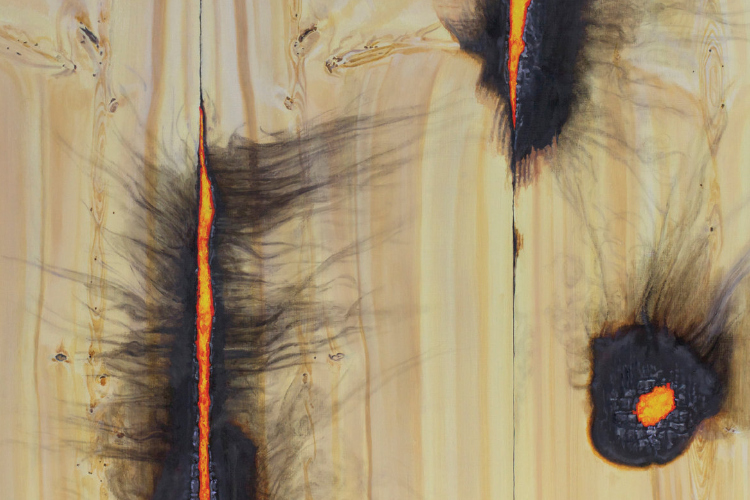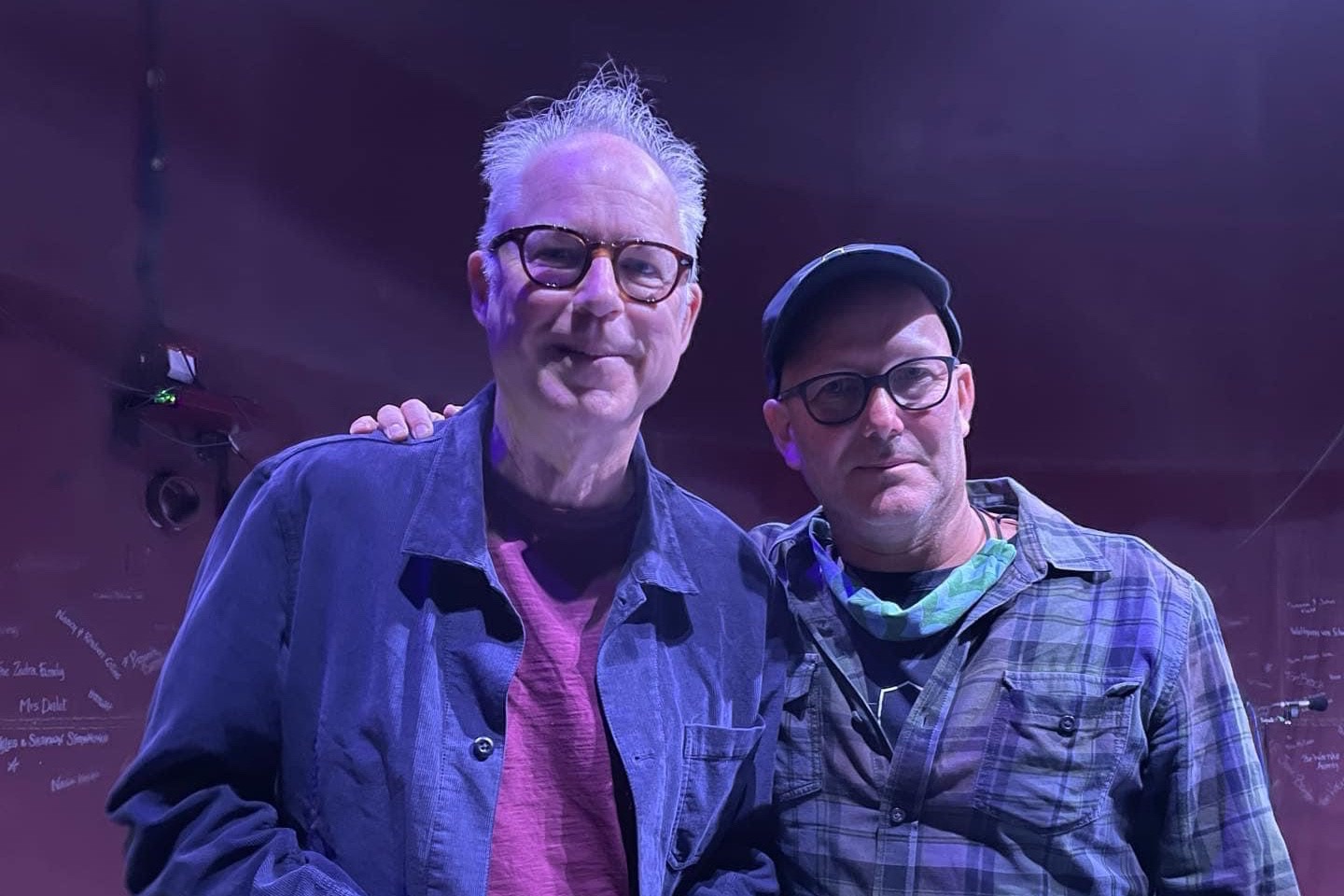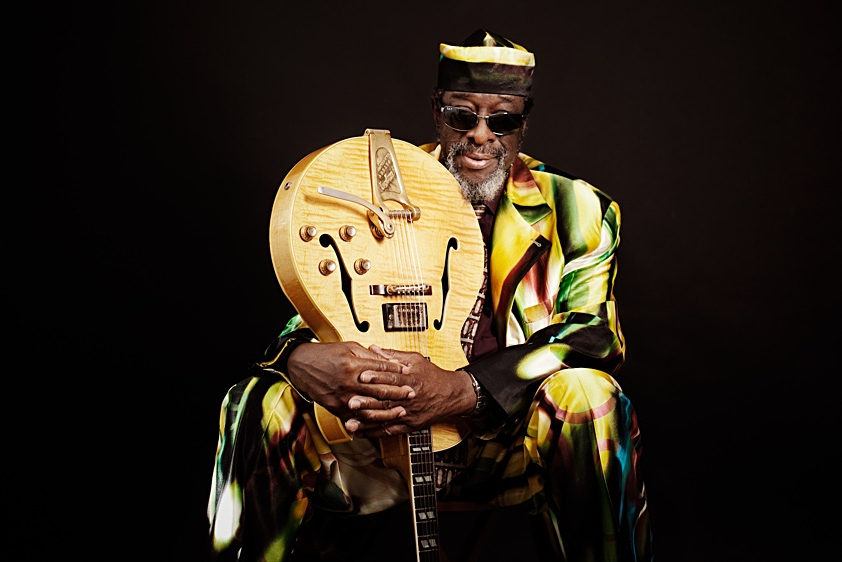Spontaneous Combustion: A Conversation with Chloë Sobek and Tim Berne on ‘Burning Up’
|
Getting your Trinity Audio player ready...
|
Artists have long written compositions that express emotional depths possible only through music. These songs can bring the listener to tears, cause goosebumps, make them want to move or call them to action. But some of the best music is not so heavily preplanned. For one, Miles Davis’ classic “So What” (Kind of Blue (Columbia, 1959) was an impromptu studio creation. In these cases, creative thinkers living in the moment and responding to one another can create something that scripted notes could not. Chloë Sobek and Tim Berne’s Burning Up(Relative Pitch, 2024) is in this category.
Before recording, the two artists had never met. Actually, Berne was even largely unfamiliar with Sobek’s unique instrument, the violone, a Renaissance precursor to the upright bass that is arcane by today’s standards. Her work often incorporates electronics and concepts from musique concrète. Of course, alto saxophonist Berne is no stranger to the experimental or pushing music forward in new directions, whether with his own groups like Blood Count or Snakeoil, or collaborations with Julius Hemphill, John Zorn, or David Torn. But the creation of Burning Up essentially put both artists in a construct built upon uncertainty. It creates a space in which neither can do anything but respond to one another in the most creative way they can imagine.
The results are incendiary. The opener, “Scorpius,” starts with Sobek’s skitteringly frenetic hits with a bow and adds staccato fractured lines on Berne’s sax. But it gradually becomes more unified, with long wails on the horn and a gentle but insistent movement on strings. “Disquiet Souls,” at times, sounds like a through-composed – albeit loosely so- piece due to the way both artists create lines that smolder and fuse with one another. But, like the rest of the album, it is not preconceived. Throughout, Burning Up is a fascinating musical inferno caused by complete artistic freedom devoid of preconceptions. The music destructively clears through all the existing brush to blaze startlingly new paths. But it is often done to allow new growth to emerge.
PostGenre: When did you first become aware of each other’s music?
Tim Berne: As we were recording [laughing]. I started checking out Chloë’s stuff after [Relative Pitch label owner] Kevin Reilly mentioned it. I think he asked me if I’d want to record with Chloë, and then I started checking some of her other stuff out online and decided I would do it. I think the first time we met was the day we recorded. Is that right?
Chloë Sobek: Yeah. It was all very spontaneous.
TB: Yes, it was. But I liked the spontaneity of it all. I’ve done things like that a few times with Kevin.
PG: Do you feel that spontaneity can be heard in the recording?
CS: I hope so. I think that is a wonderful thing about the album. I mean, did you feel like you could hear that level of spontaneity?
PG: Yeah.
TB: Definitely. I like the idea of not knowing what to expect. I mean, if you’re going to improvise for a recording, you have to go all the way. Not knowing whether you have chemistry and what the person will contribute adds a special element to the recording. Sometimes, when you play with your friends often, you have an idea of what might happen. But in this case, I had no idea, which was interesting.
PG: And you recorded the album at Tim’s home?
TB: Yeah, I had done some prior projects with Kevin where we recorded in a studio. I didn’t love the studio. Playing improvised music in the studio can be pretty rough. So I suggested that we do it at my house with an engineer, Joe Branciforte, who’s great at doing remote recordings. Acoustically, it was a little risky because I didn’t know that [the violone] was a very quiet instrument. But that was also an interesting restriction to have to play dynamically balanced with that instrument. And I had to figure out how, when I do play loud, to pick a register that would still allow the bass to come through. That was a challenge too.
But I think sometimes it’s not so bad to have limitations when you are trying to make music. The limitations focus you a little. You don’t just start wandering around looking for ideas. Or, at least, I don’t mind having some limitations.
CS: I completely agree about limitations. I often use electronics in my music, and playing solely acoustic forced me to think more creatively. Using many pedals and effects gives a sound through the amp completely different than how the instrument sounds acoustically. It also gives you significantly more volume control. You can be very loud and also very soft. The acoustic instrument is much quieter, and we had to work with that. I feel like when you’re limited, you have to work with what you have, which means you also have to think faster and, ultimately, more creatively. It made me gravitate towards different sounds that were a little more percussive. I also had to play with the register to get the sound to be a bit more dynamic in the space. I greatly enjoyed the challenge.
TB: I didn’t know at the time how much work Chloë does with electronics. I didn’t know a lot about her instrument, and it didn’t occur to me that she usually goes through a PA or an amp. I thought the violone was going to have a dynamic similar to a regular contrabass. And it was a big surprise for me when I realized that wasn’t the case. I think I found that out the night before we recorded, but I didn’t want to change things up at the last minute and thought it was cool to do it without electronics. And now, we can do another record together but with electronics.
PG: Is that something you would be interested in doing, making a second album together?
CS: I would.
TB: Definitely, but it would be tough to do. We’d have to be in the same place, and I don’t go to Australia often. But I would be interested in recording together again.
PG: So, because of the distance, you will not be performing live shows as a duo anywhere?
TB: No plans, only because of the restriction of finding things that would be worth the amount of travel needed.
CS: Totally. Though I would love to come to the [United] States again. Or Mexico.
TB: I mean, Kevin’s the one who will throw these sorts of ideas out. If anyone can make it happen, it’s Kevin.
PG: Going back to the violone, Chloë, how did you start playing that instrument?
CS: Well, I have a background as a double bassist and have played double bass for a long time. I was always aware of a story about this instrument that the double bass evolved from, the violone, which was part of the viol family. Someone had mentioned to me that the local uni[versity] had one in disrepair that no one used and just sat in a room. I borrowed it and then became quite obsessed with the instrument. I borrowed it a few times. But, at some point, the uni[versity] kept saying they needed it back. So, I ended up getting some funding together to commission an instrument maker in Melbourne to custom-make one for me. And that became my instrument.
TB: Were you playing double bass before that?
CS: Yeah, I started on the bass when I was twelve and played it quite seriously for a long time.
TB: Did you ever play electric bass?
CS: A little, but I was not very good, which doesn’t make any sense. The electric bass is so much easier to play than the double bass. But I don’t know. I just love the double bass, and that fits more into my style of music.
PG: The violone has a rich history in Western Classical music. Sometimes, some of Tim’s work – his band Snakeoil comes to mind – seems to use certain elements from Western Classical, as well. Do you feel those elements can be heard in the recording?
TB: Hmm. I’m not too into Western Classical. Maybe Country Western. I mean, everyone says that my music uses ideas from Western Classical. But that’s funny to me because I’ve listened to only about five hours of classical music in my entire life. I guess I’m good at alluding to things I haven’t listened to. But if I’m honest, I’m not influenced by it at all.
In general, I would say that many of my ideas for harmony come from having studied with Julius Hemphill and listening to his music. Almost everything that I do compositionally comes from that. Julius had a pretty wide range of harmony.
PG: Did you learn anything about composition from studying with [Anthony] Braxton?
TB: No. I was just a beginner when I studied with him. I was probably learning the C scale and songs like “Mary Had a Little Lamb.” But after that, I studied with Julius and started composing because I saw him doing it all the time. I mean, I was writing things. I wouldn’t exactly call it composing. More like making things up and putting them on paper. And then. as I learned more about notation and took more sax lessons, I could notate more complicated things. I never studied composition in any formal sense, but I listened to a million improvisers who also composed, whether Braxton, Roscoe Mitchell, or Julius. I guess I just did bad imitations of what they were doing and, eventually, through my own determination, picked up a style of my own.
PG: The entirety of Burning Up was fully improvised, but do you see each track as a wholly separate piece from the others or part of an overall arc?
CS: It was all so purely improvised, with different ideas coming out and evolving. We didn’t plan things out too much beforehand.
TB: I don’t think there is a right answer to that question. If you think it has a thread, then it does. If you’re listening to it and you see your thread, I think that’s a valid comment. But, in general, I don’t think too analytically about the music. I just listen to things and probably won’t have an opinion on something until someone asks me what I think about it. And then I come up with something. But I’m not sure. I think the thread is that it’s the two of us both thrown into the same situation. We didn’t know how each other played. We probably played for an hour and a half, maybe two hours. The longer you play together, the harder it is to find new things to try to avoid what we’d already done. In my case, I’m trying not to play anything that I played before.
PG: Well, the tracks do support a shared theme across the album related to burning and fire. Where did that theme come from?
CS: I guess I could answer that one. I don’t know. We’ve had a lot of bushfires in Australia, and it ties to those. And so I think that was really on my mind. But it’s also a general reflection on the kind of apocalyptic time that we’re living in. My brother had painted this album art, which is of burning Huon pine. It is an incredible painting and was in the back of my mind, as well.
PG: As a final question, what did you enjoy most about working together on Burning Up?
CS: I loved how spontaneous it all was. We had never played together and didn’t know one another. We just walked in and recorded straight away. I loved that because I tend to over plan and overthink things.
TB: Same for me. I generally love playing with string instruments. I even feel I patterned my sound on a viola or cello. When I played baritone [saxophone], I greatly patterned my approach to try to sound like a string player. I like having that pseudo-classical… actually, I did study classical saxophone. I forgot earlier that I had studied for a year with a classical saxophone player. That experience gave me a lot of insight into control. Many improvising saxophonists use the low register solely as an effect, not the same way they use the rest of the instrument. They go down there to play a loud and obnoxious sound. It’s never quiet and delicate. But with a string player, you can get into approaching the lower registers in a much more interesting way.
‘Burning Up’ is out now on Relative Pitch Records. You can purchase it on Bandcamp. More information on Sobek is available on her website. You can also check out some of Berne’s other works through his label, Screwgun.
Photo credit: Album art by Julian Aubrey Smith



